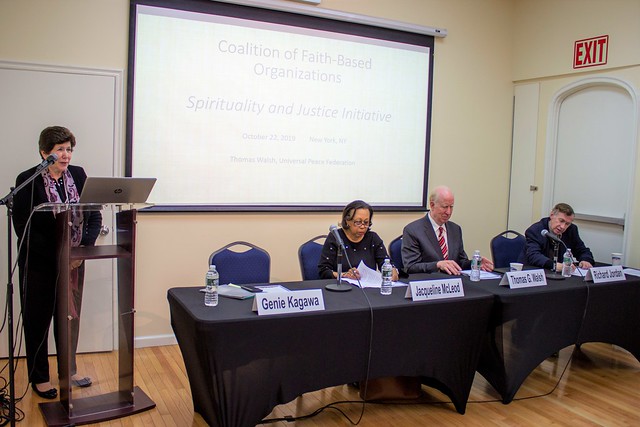New York, United States—On October 22, 2019, UPF, the Coalition of Faith-Based Organizations, and the NGO Committee on Spirituality, Values, and Global Concerns–NY (CSVGC–NY) cosponsored a program to explore the pertinence of spirituality and faith in addressing crime prevention, criminal justice reform, restorative justice, ethics and good governance. The program was titled “Spirituality and Justice: The Relevance of Faith-Based Organizations to Criminal Justice and Crime Prevention.” The event reflected ongoing expansion and improvement of partnerships with the Spirituality and Justice Coalition and other faith-based organizations around the world as well as with the United Nations, particularly the United Nations Organization on Drugs and Crime (UNODC) and the Crime Commission. Numerous representatives from faith-based organizations attending the program had recently joined the Spirituality and Justice Coalition or were interested in joining.
The moderator, Mrs. Genie Kagawa, chair emerita of CSVGC-NY, warmly welcomed the audience and opened with a brief description of the coalition’s objectives. The program began with video presentations from a UNODC International High Level Conference on Education that took place on October 7, 2019, in Vienna, Austria. The first presenter, Mr. Ibrahim Salama, from the Office of the High Commissioner for Human Rights (OHCHR), affirmed the value of a faith-based approach to crime prevention, criminal justice, anti-corruption efforts and human rights, adding that the OHCHR was incorporating this approach with its “faith for rights” initiative. Mr. Salama suggested that OHCHR could ensure optimal outcomes by creating good linkages with other faith-based organizations.
The second presenter, Dr. Azza Karam, senior advisor for the United Nations Population Fund and coordinator of the United Nations Inter-Agency Task Force on Religion and Development, stated that given the seriousness of our times, when different faith-based organizations and religious communities stand together across religious and thematic barriers, they can be the “conscience of international law and institutions.” Multifaith unity, she said, would be a strong force to help international institutions advocate for “doing what is just”. She implored people of faith and spirituality to be exemplary and bridge differences, creating an essential living model of solidarity for the sake of universal human rights and justice.
Dr. Thomas Walsh, chairman of UPF and coordinator of the coalition, presented a comprehensive review of the major impact of religion, spiritual values, and faith-based institutions on society throughout the world. He then pointed out several substantial faith-based actors and organizations at the United Nations by mentioning the Permanent Observer of the Holy See, the Organization of Islamic Cooperation, UN Alliance of Civilization, the Inter-Agency Task Force for Religion and Development, World Harmony Week, and numerous faith-related NGOs. Dr. Walsh stated that the core principles of the major world faiths include honesty, good governance, assistance to the poor, social justice, mercy, judicial fairness, and rehabilitation of offenders. The coalition intends to enshrine these principles in a document to be presented on November 13, 2019 at an interfaith service at the historic Grace Cathedral in San Francisco, the city where the original UN Charter was signed in 1945. The Coalition then will present the document at the 14th UN Congress on Crime Prevention and Criminal Justice to be convened in Kyoto, Japan, on April 20–27 2020. Dr. Walsh summarized the goals of the coalition to be an increased awareness and appreciation of faith-based organizations in crime prevention, thus strengthening the UNODC’s outreach and the promotion of community-level partnerships between faith-based organizations and local governments, law enforcement and criminal justice offices.
An example of best practice in the area of Prison Reform, Mrs. Jaqueline McLeod, MPH and executive director of Healing Communities Network (HCN), described her prison re-entry program for the incarcerated and formerly incarcerated, which has been effective in addressing issues of trauma and successful re-integration into the community. The program is based on an understanding of the Divine dignity of every person and empowers individuals to direct their own rehabilitation in support groups that build self-esteem and a sense of community. Mrs. McLeod emphasized that directiveness from support group leaders can help prisoners take responsibility for their emotions, decisions, and interactions with others, which is key for ensuring personal development within prison and success once outside. As co-convener of the Rev. Dr. Lonnie McLeod, Jr. Symposium for Faith Communities and Incarceration, Mrs. McLeod has witnessed increased effectiveness in community healing and development when faith-based organizations collaborated and worked together.
Mr. Richard Jordan, main UN NGO representative of the Blue Community Consortium, revealed various opportunities that exist that are based on UN policies, in addition to initiatives by faith-based communities in New York, and how united efforts have been successful in implementing prison reform for a more compassionate treatment of prisoners. One example that he cited was an initiative of the Episcopal Diocese of New York, St. Bartholomew’s and the St. Bartholomew’s Chapter of the Episcopal Peace Fellowship, which called on New York State to end any use of prolonged solitary confinement as an instrument of torture in our prisons, jails and detention centers and to find alternatives for solitary confinement. Building on the Scriptures’ mandate regarding the treatment of prisoners, resolutions have been formulated through legislation, voted on and implemented.
In conclusion, beneficial partnerships between faith-based organizations and criminal justice institutions have been shown to be effective instruments towards improving the criminal justice mechanisms through various political, economic, social and legal reforms.

